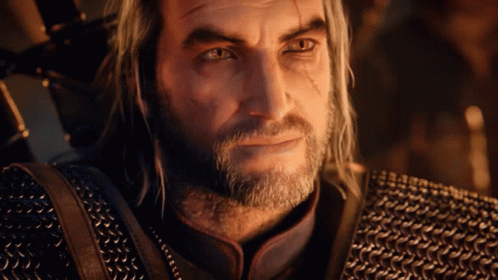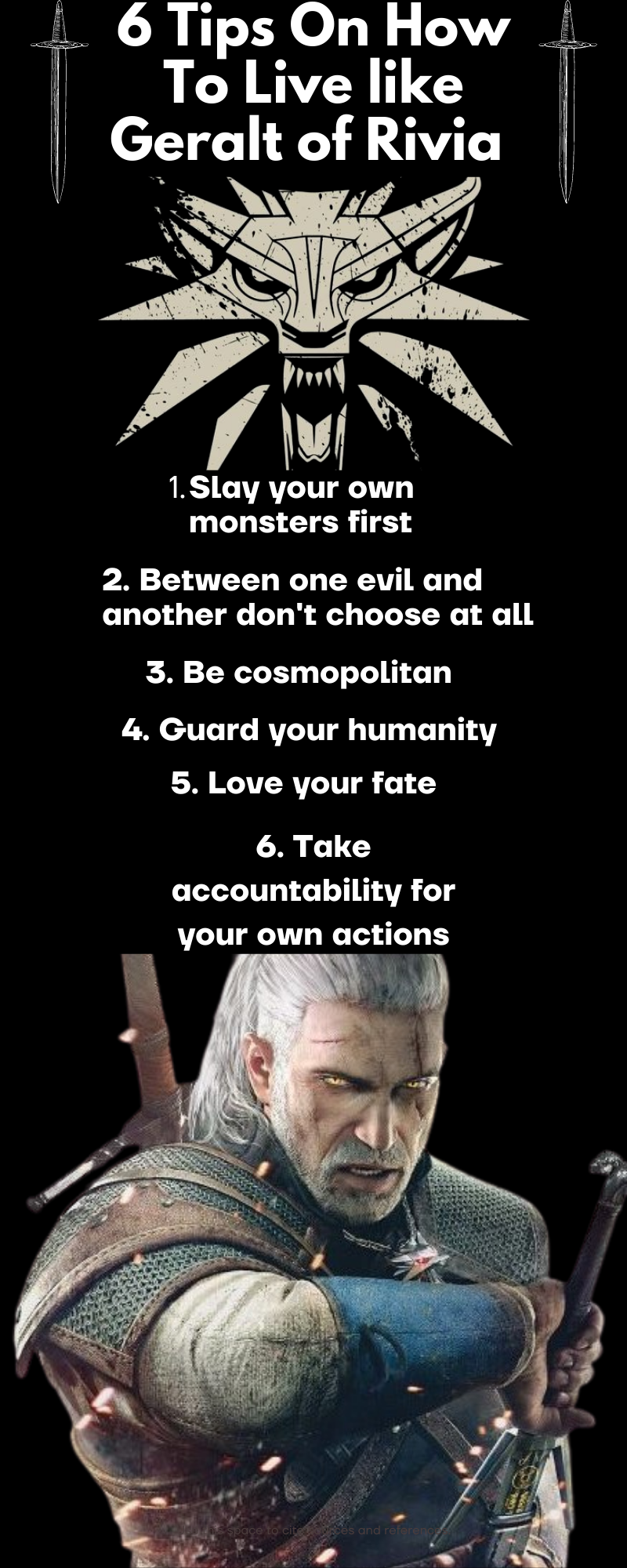Popular culture is filled with characters who live and breathe philosophy through their actions. It’s through this lens I find philosophy easier to interpret and become more thoughtful about how to apply certain lessons in my own life.
When it comes to a philosophy like Stoicism, a character that displays Stoic aspects is Geralt of Rivia from The Witcher series.
I’ll caveat this article by saying I don’t believe Geralt to be a pure Stoic. What is worth noting is that he does embody certain traits that gel with the philosophy.
So, let’s take a deeper look into The White Wolf’s philosophy of life and how it can help to make Stoicism easier to understand.

Stoicism vs stoicism for Witchers
As a witcher, Geralt provides a strong example for understanding the difference between upper case Stoicism and lower case Stoicism.
Within the world of The Witcher, Geralt is a monster hunter for hire who’s treated with suspicion and disgust by the general population. The common story behind witchers is that they are mutants who’ve been stripped of all emotion and are little more than heartless killers and mercenaries.
Geralt himself has been subjected to even more mutations than his fellow witchers. So, you’d expect him to display stoic tendencies of being unfeeling and robotic right?
Wrong.
Across the books, games and Netflix series, Geralt has demonstrated great emotion on a number of occasions. He’s a father, a friend, a lover, a fighter, a warrior and an accidental philosopher. He’s embodied all the Stoic virtues of courage, justice, wisdom and temperance.

Courage
The Stoics would define courage as physical and moral. Physical courage would be running into a burning building to save another person’s life. Moral courage is having the inner strength to speak truth to power and Geralt has displayed physical and moral courage time and again.
Physical courage comes with the territory of being a witcher. He’s willingly put his life in danger to protect people from monsters. Geralt’s moral courage comes with his penchant for speaking his mind to rulers, kings, politicians and madmen, as shown here:
“Set out on your chessboard,’ said Geralt, ‘the kings, queens, elephants and rooks, and don’t worry about me, because I mean as much on your chessboard as the dust on it. It’s not my game. You say I’ll have to choose? I say you’re wrong. I won’t choose. I’ll respond to events. I’ll adapt to what others choose. That’s what I’ve always done.”
In the context of this quote, Geralt is speaking to a dark sorcerer called Vilgefortz, who coveted power. He’s pushing back against the notion that he has to make a decision that will compromise his values and this is a common theme that runs throughout the White Wolf’s personality.
Courage is also about taking accountability for your own actions and admitting mistakes have been made. It’s about taking the blame and learning how to do better next time, as Geralt points out:
“Mistakes are also important to me. I don’t cross them out of my life, or memory. And I never blame others for them.”
Justice
The Stoic view of justice goes beyond the legal system. Justice represents duty to our fellow men and women, to society as a whole. It’s the highest form of morality and the reasoning behind how we act in relation to our wider community.
Geralt’s view of justice has much in common with the Stoics because he takes a cosmopolitan perspective of the world. The Witcher universe is inhabited by several races, including elves, dwarves and other species that humans consider to be ‘monstrous.’
“Your vision is a world where people are afraid to venture out after dark; not for fear of cut-throats, but of the guardians of public order. For, after all, the result of all great crackdowns on miscreants is always that the miscreants enter the ranks of the guardians of public order en masse. Your vision is a world of bribery, blackmail and entrapment, a world of turning imperial evidence and false witnesses. A world of snoopers and coerced confessions. Informing and the fear of being informed upon. And inevitably the day will come in your world when the flesh of the wrong person will be torn with pincers, when an innocent person is hanged or impaled. And then it will be a world of crime.”
To Geralt, everyone’s the same and he dutifully protects people who he feels need to be protected. He’s also made friends with people across all spectrums of life, further highlighting his cosmopolitanism.
Temperance
As summed up on the Daily Stoic “temperance is the knowledge that abundance comes from having what is essential. The Stoics often used temperance interchangeably with self-control. Self-control, not just towards material goods, but self-control, harmony, and good discipline always – in pleasure or pain, admiration or contempt, failure or triumph.”
Self-control is an important part of being a witcher that was drummed into Geralt from an early age by his father figure and mentor Vesemir. Through his training, Geralt learned how to appreciate the smaller things in life, of making do with what was in front of him. A dirt road to sleep on. A starry sky to look up at. A simple meal and ale in a tavern while travelling on The Path.
While some witchers are motivated purely by money, Geralt is an exception and often finds himself in situations where he defends the downtrodden and the innocent without any reward.
Wisdom
All the Stoic virtues can’t be applied properly without wisdom. The knowledge of the right way to act, the desire to learn that which you don’t already know.
At nearly 100 years old, Geralt has had plenty of time to learn harsh lessons and see the world as neither good nor bad. It simply is.
“You can’t stop a soldier from being frightened but you can give him motivation to help him overcome that fear. I have no such motivation. I can’t have. I’m a witcher: an artificially created mutant. I kill monsters for money. I defend children when their parents pay me to. If Nilfgaardian parents pay me, I’ll defend Nilfgaardian children. And even if the world lies in ruin—which does not seem likely to me—I’ll carry on killing monsters in the ruins of this world until some monster kills me. That is my fate, my reason, my life and my attitude to the world. And it is not what I chose. It was chosen for me.”
This quote reveals Geralt’s acceptance of his fate, of his attitude towards defending people from all walks of life. It’s reminiscent of the concept of amor fati, a love of fate and learning to enjoy the good and bad.
Geralt’s acceptance of his fate is also revealed through moving past his identity as a mutant and living as best he can.
“I manage because I have to. Because I’ve no other way out. Because I’ve overcome the vanity and pride of being different. I’ve understood that they are a pitiful defense against being different. Because I’ve understood that the sun shines differently when something changes, but I’m not the axis of those changes. The sun shines differently, but it will continue to shine, and jumping at it with a hoe isn’t going to do anything.”
But this acceptance shouldn’t be mistaken for passivity. The Stoics weren’t passive. They took part in community affairs, they stood their ground and they fought for what they believed in.
Another quote that signifies Geralt’s wisdom is this:
“Evil is evil. Lesser, greater, middling… Makes no difference. The degree is arbitrary. The definition blurred. If I’m to choose between one evil and another I’d rather not choose at all.”
Geralt has the awareness to see there is no middle line between what constitutes a ‘good’ act and a ‘bad’ act. Either you act virtuously, or you don’t.

6 Tips On How To Live Like Geralt Of Rivia
Now that we’ve examined Geralt’s philosophy of life through the lens of Stoicism, here are six quick tips on how to apply The Witcher’s teachings to your everyday life.
- Slay your own monsters first: Before you can help others, you must start with yourself. Examine what areas of your life you want to change and dedicate yourself to the task of changing every day.
- Between one evil or another don’t choose at all: Always think about how to make the right decision that’s appropriate for the situation. Don’t compromise on your beliefs and remember money and other externals are temporary. The only thing that lasts is character.
- Be cosmopolitan: It’s your duty to be a citizen of the world and to help others regardless of their backgrounds.
- Guard your humanity: Even in the most difficult of situations never lose sight of who you are or the good you want to provide for yourself and others.
- Love your fate: Accept the situation that you’re in and be grateful for the things that you do have.
- Take accountability for your own actions: Remember that it’s okay to make mistakes. Own them, learn from them and ask for help when you need it.